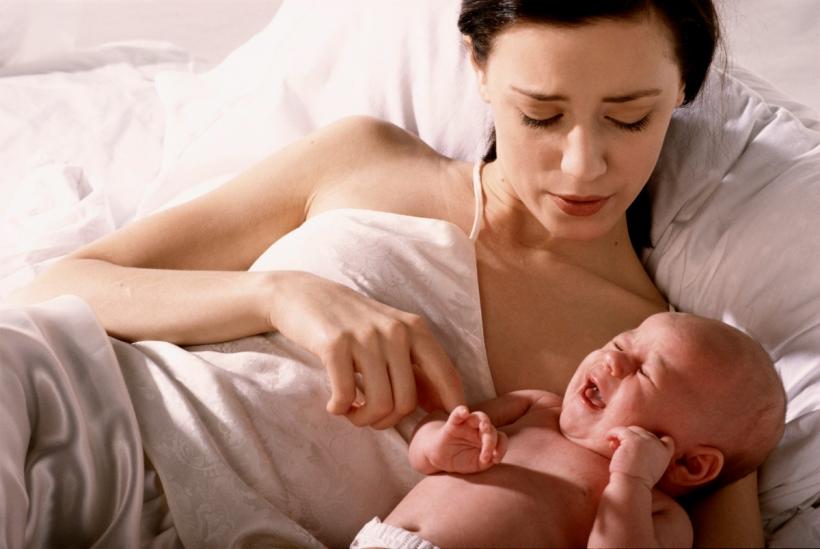
“Hormonal changes during and after pregnancy are NORMAL. Mood changes are NORMAL.” Image: Thinkstock
It’s not just about making sure one person is healthy — it’s about helping an entire family.
In a big move for well, really everyone, the U.S. Preventive Services Task Force issued new recommendations this year that pregnant and postpartum women have more rigorous screenings for depression and other mental health disorders.
The guidelines, which appeared in the Journal of the American Medical Association, noted that depression is common in pregnant and postpartum women and “affects not only the woman but her child as well.” The recommendations are important because they could mean a shift in the way that pregnancy care providers approach care for pregnant women throughout their pregnancies and into their transition as mothers.
While most providers and most women are pretty aware of postpartum depression and there are multiple screening “checkpoints” in place for PPD, depression during pregnancy isn’t as well addressed. And because many cases of PPD actually begin during pregnancy, it’s important that both mothers and care providers are aware of the risk of mental health disorders through pregnancy and into the postpartum period — and have the resources to remain healthy both physically and mentally. Just as a pregnant woman with a physical condition such as diabetes could have complications with her baby, so too could a woman with depression. Untreated depression has very serious physical medical repercussions for her and her baby.
“All mothers need access to affordable, reliable, and appropriate mental health care,” explains Jenna Hatfield, 34, the Online Awareness & Engagement Manager for Postpartum Progress, a non-profit organization dedicated to raising awareness about maternal mental illness. “Too often we see moms slip through the cracks because there’s too much red tape to access care or continue care they’ve sought out. Additionally, under-served moms aren’t always made aware of the care available to them, and that’s simply not acceptable.”
As part of the new recommendations to make sure that no mother is falling through the cracks, for example, the American Academy of Pediatrics recommends that pediatricians (not just OB doctors or midwives) screen new mothers at their babies’ one-month, two-month, and four-month checkups.
Raising awareness about mental health as a parent is so important because it’s not just about making sure one person is healthy — it’s about helping an entire family.
“Our mission is to create healthier families by raising awareness, reducing stigma, providing social support and connecting mothers to help for perinatal mood and anxiety disorders like postpartum depression,” says Hatfield. “We strive to bring moms the information they need to seek out the best care for their situation; we encourage them during their darkest days; we provide peer support which is extremely important in helping moms recognize they are not alone; we’re currently sponsoring moms to be trained in Mental Health First Aid; and we help connect moms with care providers. We hope that in doing all that we do, more moms will truly feel less alone, seek and find appropriate care, and then use what they’ve learned to help other moms. It’s a cycle; it’s a community.”
Hatfield also points out that we need to redefine our notion of what “normal” motherhood is supposed to feel like.
“Add in the expectation that the mom should be able to handle the return to work, the change in hormones, the new responsibility of a child, and all the other things in her life, and we’re setting mothers up with a load of stress we wouldn’t wish on our worst enemies,” she notes. “When these mothers then admit they’re struggling, they’re told it’s just the ‘baby blues’ or that this is what motherhood is like. No. We need to support these moms, all moms.”
A lot of people have this idea that motherhood is supposed to be miserable and it’s just part of the package deal, like stretch marks or saggy boobs. But guess what? Not everyone gets stretch marks, but more importantly, not everyone gets a mental health disorder, either. Acclaimed author and spiritual advisor Marriane Williamson made waves when, in response to the new guidelines, she wrote a Facebook post declaring that “Hormonal changes during and after pregnancy are NORMAL. Mood changes are NORMAL.” She also explained in the resulting comment box that:
“Depressed women are like canary in a coal mine… Postpartum depression, example, is often a result of a woman’s heartbreak over having to go back to work sooner than her body, mind and heart are ready to… In many such instances, the disease is not inside the woman; the disease is inside a system so based on greed that it does not honor parents’ need to remain with their children long enough after birth.”
Um, say what?
While I won’t argue with the woman that the system does need to change and women should certainly have more choices available to them after giving birth, we can’t keep on drilling the idea that postpartum depression is by any way, shape, or form a “normal” part of modern-day motherhood. “Postpartum mood and anxiety disorders don’t discriminate,” explains Hatfield bluntly. “There are risk factors, yes, but your income, your readiness, your excitement? PPD just doesn’t care.”
Luckily, Postpartum Progress set Williamson — and hopefully the thousands of women that were influenced by her — straight with this response. And the organization, along with many other women like Hatfield herself who have experienced a mental health disorder, wants women to know that postpartum depression can happen to anyone.
So while we wait for the world to catch up and doctors and care providers to implement mental health screenings throughout pregnancy and in the postpartum period, Hatfield recommends new mothers and moms currently expecting a baby to do the following to know, prevent, and recognize PPD:
- Surround yourself with a great support group.
- Be aware of the symptoms of postpartum depression.
- Print out a New Mom Checklist before your baby arrives, so you can look at it during the first two weeks and take it to your checkup if something feels off.
- Be honest with that support group and ask for help when you need it.
- And know this: You are the perfect mom for your baby.
And in the words of Hatfield, the No. 1 thing that all mothers need to realize?
“You are not alone, mamas.”
"Something Is Finally Being Done About Pregnancy and Postpartum Depression” by Chaunie Brusie originally appeared on Babble.com.
More from Babble:







